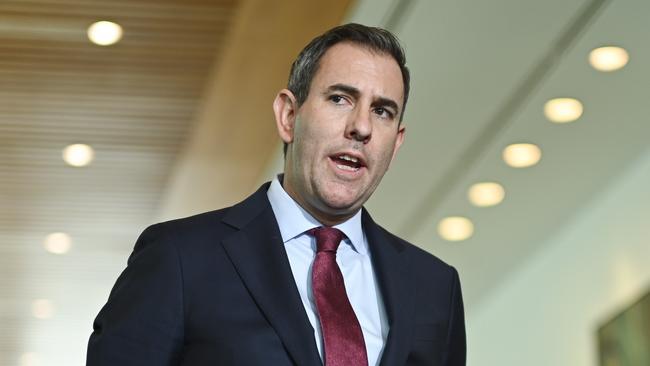‘Unhinged’: Jim Chalmers takes aim at Future Fund criticism
Jim Chalmers has claimed critics of his overhaul to the Future Fund’s investment mandate are ‘unhinged and ill-informed’.

Jim Chalmers has claimed critics of his overhaul to the Future Fund’s investment mandate – including fund architects John Howard and Peter Costello – are “unhinged and ill-informed”, as the fund’s most recently departed board members expressed concern at the changes.
The Treasurer on Friday said he had directed the $230bn sovereign wealth fund to consider Labor-aligned “national priorities” covering housing, green energy and infrastructure when determining its investments.
But former board member Jane Wilson, who served as a guardian of the fund from 2015 to 2021, warned Dr Chalmers’ intervention was “completely changing” the fund’s purpose.
“Even though the new mandate doesn’t specifically say where [funds are invested], it does nudge them that way. Where does that stop?” Dr Wilson asked.
“Those small nuances can affect the risk of the returns that you’re going to get, so it will have an effect on the returns.”
She speculated that that the government could change the Future Fund Act, using the fund for political means, including “shoring up budgets”.
“I think it outlines the financial illiteracy of people in making suggestions where they really don’t understand investment or capital markets. Financial literacy here is wanting.”
Perth businessman John Poynton, who also served on the fund’s board for a decade from 2014 until February, also raised concerns with the changes.
“I’m disappointed because I think the way that [former treasurer] Peter [Costello] and the then government set things up was appropriate and worked very well,” Mr Poynton said.
well as criticism from Mr Howard and Mr Costello, former finance minister Nick Minchin accused Dr Chalmers of undermining the Future Fund’s independence and politicising it, arguing the shift would ultimately lead to lower returns.
But Dr Chalmers dismissed the criticism as politically motivated, claiming the Coalition had been forced to “wheel out” Mr Howard to condemn the changes.
“John Howard on the front of The Australian bagging the Labor Party has been happening since before I was born, and so I don’t think that’s an especially big revelation,” he said in Canberra.
“What we heard from the Coalition yesterday was really, I think, a pretty frank admission that they don’t want to see more investment in housing, cleaner and cheaper energy, or more resilient infrastructure.
“There will always be predictable partisan hyperventilating from predictable partisan people. We’re just seeing the usual suspects.”
Speaking earlier, Greg Combet, a climate change minister during the Rudd and Gillard governments who was installed to chair the Future Fund by Dr Chalmers in February, also dismissed the Coalition’s criticism, claiming the fund’s primary focus would remain on maximising returns.
“It means that we’re mindful of what the government’s interests are but that is not determinative,” he said. “We will look at the array of investment opportunities in front of us, including in these areas of national priority, but we will make the judgment about where we’ll find the best risk-adjusted return and how best to put our portfolio together.”
The Coalition has raised concerns Labor’s changes could breach the Future Fund Act. Under amendments to the act passed in 2006 by the Howard government, ministers must not give a direction to the fund “that has a purpose, or is likely to have the effect of directly or indirectly” requiring the board to invest in a particular activity, asset or business. However, asked if he would release legal advice that showed Labor’s changes were not in breach of the act, Mr Combet declined to do so. “That’s privileged material,” he said.
Dr Chalmers similarly did not commit to release the legal advice, but argued the government was “satisfied” that its changes did not breach the fund’s enabling legislation. “It’s not unusual to get legal advice on issues like this, and it would be very unusual to release it,” he said.
“We are asking the Future Fund to consider these national economic opportunities as part of taking their individual investment decisions independently. That hasn’t changed. It remains entirely consistent with the legislation.” The Weekend Australian understands the legal advice received by the government shows its changes will not be in breach of the act, as they require the fund to only give consideration to the new national priorities, rather than an explicit directive.
Former Labor treasurer Wayne Swan also criticised the Coalition for “dragging out John Howard and Peter Costello”, saying there was nothing wrong with laying out new national priorities for the fund. “This is just absurd political criticism,” he said.




To join the conversation, please log in. Don't have an account? Register
Join the conversation, you are commenting as Logout